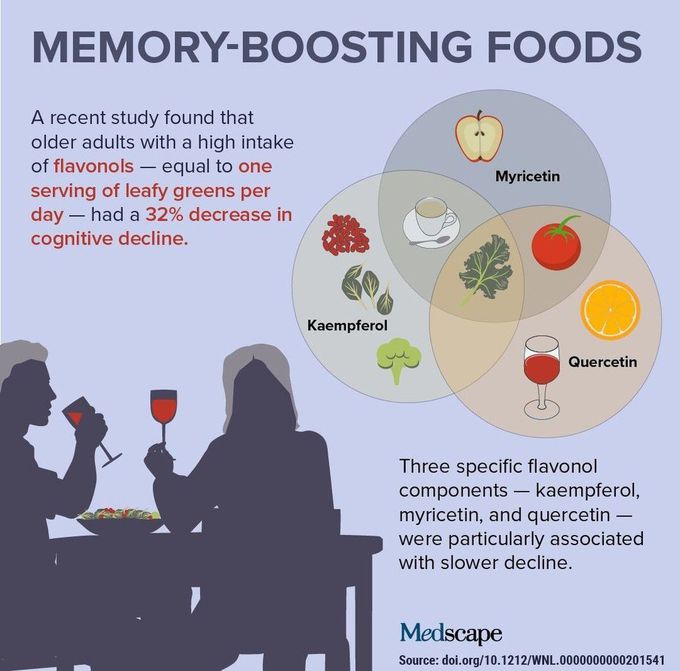


Memory-Boosting Foods
The end of the year and accompanying holidays are often tied to food. Perhaps that explains why increased interest in recent findings related to nutrition and cognition resulted in this week's top trending clinical topic. A recent study has added to a growing body of evidence regarding the impact of flavonols on memory and brain health. Flavonols are a subclass of flavonoids, which can be found in vegetables (eg, onions, kale, lettuce, tomatoes) and fruits (eg, apples, grapes, berries), as well as some teas and wines. Evidence had previously demonstrated that some flavonol components reversed histologic hallmarks of Alzheimer's disease in mice. This new research shows the potential for benefit in humans as well. The study included around 960 participants (average age, 81 years). Most were female (75%) and White (98%). Over an average of 7 years of follow-up, they filled out an annual nutritional questionnaire and completed cognitive and memory tests. To determine rates of cognitive decline, researchers used an overall global cognition score summarizing 19 cognitive tests. After adjusting for various factors, researchers found a significant difference in cognitive decline between those with the highest vs the lowest intake. The group with the lowest flavonol intake consumed about 5 mg/d, whereas the group with the highest consumed an average of 15 mg/d. The average amount of flavonol intake in US adults is about 16-20 mg/d. Participants with the highest intake of kaempferol had a 32% slower rate of cognitive decline than those with the lowest intake. Those with the highest intake of quercetin had a 30% slower rate. Those with the highest intake of myricetin had a 31% slower rate. What about the opposite side of the food-brain connection? A recent study found that a diet high in ultraprocessed foods (UPFs) increases the risk for dementia. Reference: Medscape
Living with Alzheimer’s disease was one of the hardest experiences of my life. The memory loss, the confusion, and the fear of losing myself weighed on me every single day. I had tried so many treatments and medications, but nothing seemed to stop the disease from progressing.Out of both hope and desperation, I came across NaturePath Herbal Clinic. At first, I was skeptical, but something about their natural approach and the stories I read gave me the courage to try one more time.I began their herbal treatment program, and within a few weeks, I noticed small changes clearer thinking, better focus, and a calmer mind. Over the months, those improvements became more and more obvious. Today, I can truly say my life has changed. My memory has improved, and I feel more present and engaged than I have in years.This isn’t just a testimony it’s a heartfelt recommendation to anyone struggling with Alzheimer’s or other chronic conditions. Don’t give up hope. I’m so grateful I gave NaturePath Herbal Clinic a chance. Visit their website to learn more: www.naturepathherbalclinic.com info@naturepathherbalclinic.com


